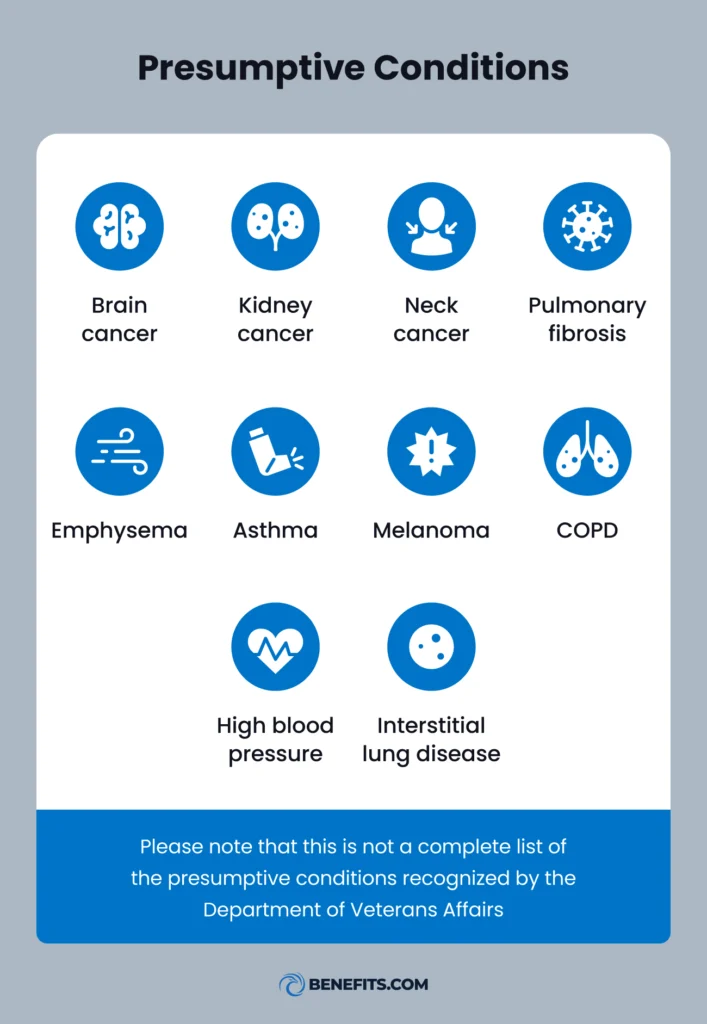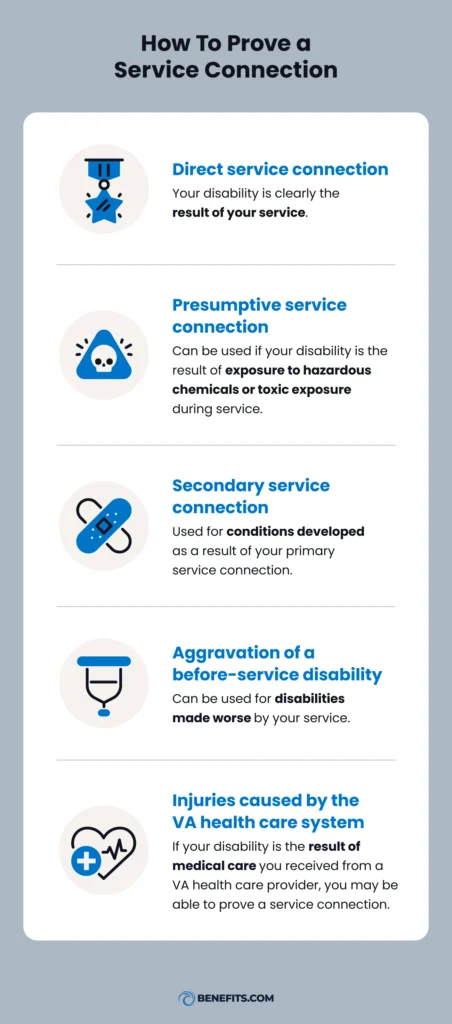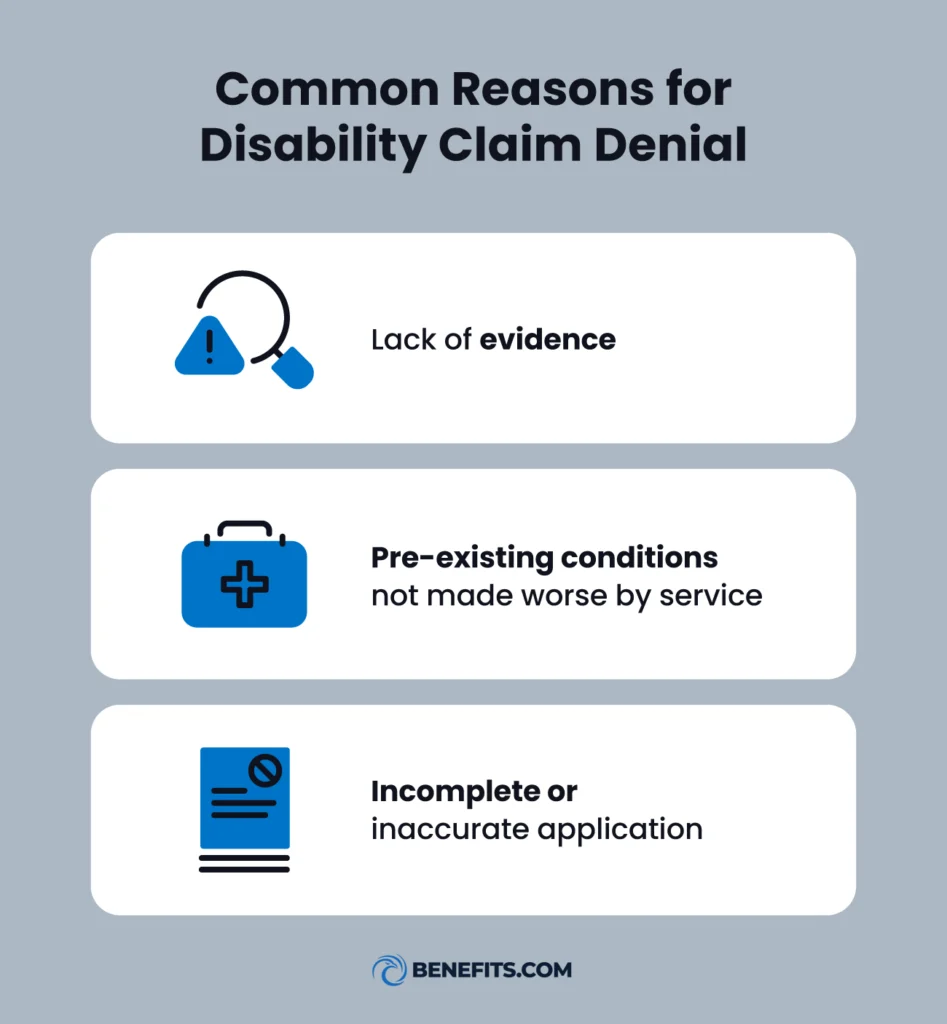Presumptive disabilities are conditions that the Department of Veterans Affairs (VA) recognizes as automatically resulting in a qualifying disability. If you’re diagnosed with one of these conditions, you may be eligible to receive benefits from the VA, but can the VA deny a presumptive disability when you file your claim?
They can. It depends on the circumstances of your condition and the proof you submit when filing your claim. We’ll explore the qualifying conditions outlined in the PACT Act, the evidence needed to support your claim, and how to prove a service connection.
What is the PACT Act?
The PACT Act, more formally known as the Honoring our PACT Act of 2022, was signed into law on August 10, 2022. It’s designed to provide more expansive health care and benefits to qualifying veterans exposed to toxic substances and burn pits during their active duty service. According to the VA, veterans protected under this act include:
- Veterans of the Vietnam era
- Veterans of the Gulf War era
- Veterans of the post-9/11 era
- Veterans with toxic exposures
The purpose of this act is to make health care more accessible to veterans who may not otherwise qualify for benefits and ensure that veterans and their surviving family members receive the help they deserve. As of March 4, 2024, the VA began offering expanded health care to qualifying veterans under the act.
PACT Act Presumptive Conditions List
Here are the current conditions approved under the PACT Act:
Presumptive Conditions Approved Under the PACT Act | ||
| Cancers | Illnesses | Agent Orange Conditions |
| Brain cancer Gastrointestinal cancer Head cancer Kidney cancer Lymphoma Melanoma Neck cancer Pancreatic cancer Reproductive cancer Respiratory cancer | Asthma diagnosed post-service Chronic bronchitis Chronic obstructive pulmonary disease (COPD) Chronic rhinitis Chronic sinusitis Constrictive bronchiolitis Obliterative bronchiolitis Emphysema Granulomatous disease Interstitial lung disease (ILD) Pleuritis Pulmonary fibrosis Sarcoidosis | High blood pressure/hypertension Monoclonal gammopathy of undetermined significance (MGUS) |
Please note that this is not a complete list of the presumptive conditions recognized by the Department of Veterans Affairs. These are just the new conditions added under the PACT Act.

What Evidence Is Needed for Your Disability Claim?
To qualify for benefits under the PACT Act with a presumptive disability, all you need to do is meet the service requirement for that presumption. The exact requirements you’ll need to meet will depend on the type of condition you’ve developed.
Veterans in the following groups may qualify for presumptive disability benefits:
- Former prisoners of war: If you are a former prisoner of war that has a condition that is at least 10% disabling, you may have a presumptive condition. This will depend on the length of imprisonment.
- Vietnam veterans: Exposure to Agent Orange or service in certain locations may lead to a presumptive condition.
- Atomic veterans exposed to ionizing radiation: Certain circumstances related to exposure to ionizing radiation (such as participation in atmospheric nuclear testing) may cause a presumptive condition.
- Gulf War and post-9/11 veterans: Presumptive conditions for this group depends on when and where you served.
For a complete list of presumptive conditions for these groups, refer to this fact sheet from the VA.
For non-presumptive conditions, you’ll need to submit proof of your disability. Without that proof, the VA may deny your claim. While a denial doesn’t mean that the VA will dismiss your case permanently, it does mean that you could have to spend more time resubmitting documents and evidence, which could delay the treatments you need.
The more detailed you can be when submitting your claim, the better. The VA recommends submitting the following documents when you file your claim:
- Military separation documents like DD214
- Medical records from your time of service
- Proof of your disability’s connection to exposure during your service
- Additional medical documentation showing the extent or severity of your condition
Speak with your physician and any health care providers you worked with during your time of service. They should be able to send you copies of your medical records and may be willing to provide a witness statement discussing your diagnosis, treatments, and any other evidence that can prove your condition was the result of exposure during your service.
You may also submit buddy letters or witness statements from friends, family, therapists, and anyone else who could speak to your condition and disability.
Once the VA processes your claim, they’ll provide you with a disability rating documenting the severity of your disability and how much it impacts your daily life. You’ll receive benefits based on that rating, and the higher the rating is, the greater your compensation will be.
5 Ways To Prove a Service Connection
If you’re suffering from the symptoms of Agent Orange exposure or dealing with an ongoing illness that interrupts your life as a result of your military service, you may be eligible for a claim under the PACT Act. But to be eligible, you’ll need to prove a service connection to your disability, and there are several ways to do that.
1. Direct Service Connection
A direct service connection means your disability is clearly the result of your service. Typically, these connections cover disabilities resulting from injuries that occurred when you were on active duty. Examples include cancer related to exposure to Agent Orange or exposure to toxic waste at Camp Lejeune.
2. Presumptive Service Connection
Presumptive service connections can cover you if your disability may be the result of exposure to hazardous chemicals or toxic exposure during your time of service. To prove a presumptive service connection, you’ll simply need to meet the service requirements for that presumption.
3. Secondary Service Connection
Secondary service connections cover conditions developed as a result of your primary service connection. For example, if your doctor diagnosed you with hypertension and you later developed heart disease, your heart disease could be considered a secondary service connection disability.
4. Aggravation of a Before-Service Disability During Service
If you joined the military with a known health condition, your service could make that condition worse. In cases like this, you may be able to prove aggravation of a before-service disability during service. You’ll need to provide documentation showing that your health condition worsened after service to qualify and that the worsening of your health resulted from your military service.
5. Injuries Caused by the VA Health Care System
If your disability is the result of medical care you received from a VA health care provider, you may be able to prove a service connection. The VA allows claims for disabilities resulting from treatment you received or for an existing condition getting worse as a result of treatment you received in the VA health care system.
To prove a connection, you may need to get a second opinion from an outside medical provider who can back up your claim and strengthen your claim with the VA.

Can You Appeal a Denied VA Disability Claim?
The VA will review your claim and make a decision as quickly as they can. While they approve many claims, there’s no guarantee that yours will be, and if it is, there’s no guarantee that your disability rating will be adequate for your needs. Luckily, you’re able to appeal a denied claim.
To appeal your claim, you’ll start by filing a Notice of Disagreement, which acts as an official notice to the VA that you disagree with their decision and want to appeal your claim. Once you file your notice, you can choose to have your appeal handled by the full VA Board of Appeals or work with a Decision Review Officer, which may be faster. They’ll review your documentation and render a new decision based on their review of the evidence. This process will take time. It’s not uncommon for appeals to take a year or more to resolve.
Keep in mind that you may want to work with an attorney during your appeal, especially if you’re appealing VA disability claims that cannot be proven. They can help you compile additional evidence, represent your interests with the VA, and give you advice throughout the process.

Get Help Navigating VA Disability With Benefits.com
The VA can deny a presumptive disability claim, but you can appeal their decision, whether they’ve denied your claim outright or you’re unhappy with the disability rating assigned to your disability. You’re entitled to the benefits that you worked so hard for. Contact our team of advisors to ensure you’re getting the compensation you deserve under the PACT Act.
 Benefits.com Advisors
Benefits.com Advisors
With expertise spanning local, state, and federal benefit programs, our team is dedicated to guiding individuals towards the perfect program tailored to their unique circumstances.
Rise to the top with Peak Benefits!
Join our Peak Benefits Newsletter for the latest news, resources, and offers on all things government benefits.




















